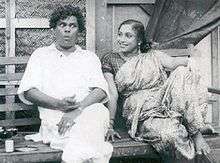Paithiyakkaran
| Paithiyakaran | |
|---|---|
 N. S. Krishnan and T. A. Mathuram in Paithiyakaran | |
| Directed by | Krishnan-Panju |
| Produced by | D. Ramaswamy |
| Written by | S. V. Sahasranamam |
| Starring |
N. S. Krishnan M. G. Ramachandran T. A. Mathuram S. V. Sahasranamam D. Balasubramaniam S. J. Kantha |
| Music by |
C. R. Subburaman M. S. Gnanamani |
| Cinematography | P. S. Selvarasu |
| Edited by | Panchami |
Production company |
N. S. K. Pictures |
Release dates | 26 September 1947 |
Running time | 180 min. (16,201 Feet) |
| Country | India |
| Language | Tamil |
Payithiyakaran (Tamil: பைத்தியக்காரன்) is a 1947 Tamil film produced by and starring N. S. Krishnan. It was based on the play of the same name staged by Krishnan's drama troupe. It was the first film for Krishnan after his acquittal in the Lakshmikanthan murder case. M. G. Ramachandran (MGR) played a supporting role in the film.[1][2][3][4][5]
Production
When N. S. Krishnan was in prison for the Lakshmikanthan murder case, his wife and comedienne T. A. Mathuram started a drama troupe called N. S. K Nataka Sabha. The troupe mainly staged plays written by and starring S. V. Sahasranamam. Paithiyakaran (lit. The mad man) was one of those plays. When Krishnan was first sentenced to jail, Mathuram took a break from her acting career. Later she came out her self-imposed exile to generate revenues for financing her husband's appeal to the privy council. With Mathuram in the lead, Paithiyakaran was a hit in Chennai. It was based on V. Shantaram's 1937 film Duniya Na Mane. Mathuram converted the troupe into a film production company and made a film based on the play. The film advocated reformist social policies like widow remarriage. It was directed by the director duo of P. Krishnan and S. Panju. While the film was in production, Krishnan was acquitted in the murder case and was released from prison. A new role was written for him in the film. Mathuram played dual roles as the heroine and as Krishnan's comedic foil. Krishnan made fun of his stint in prison through the song jailukku poi vantha in which he described in prison life, his fellow inmates and the types of prisoners he met. Music for the film was composed by C. R. Subburaman and M. S. Gnanamani. Pattukoru pulavan bharathi - a work of the poet Kavimani Desigavinayagam Pillai was used in the film as lyrics for a song featuring T. A. Jayalakshmi. M. G. Ramachandran (later Chief minister of Tamil Nadu) played a supporting role in the film. The completed film was 16,201 feet in length.[1][2][3]
Plot
Paithiyakaran was based on V. Shantaram's Duniya Na Mane, which in turn was based on the Marathi novel, Na Patnari Goshta by written by Narayan Hari Apte. It was a socially themed movie which advocated for widow remarriage and against older men marrying women much younger than them.[1]
Cast and crew
- N. S. Krishnan
- T. A. Mathuram
- M. G. Ramachandran
- D. Balasubramaniam
- S. J. Kantha
- S. R. Janaki
- T. A. Jayalakshmi
- S. V. Sahasranamam - Actor, Screenplay and Dialogue
- P. Krishnan, S. Panju - Directors
- C. R. Subbaraman - Music
- M. S. Gnanamani - Music
- Desiga Vinayagam Pillai - Lyrics
- Udumalai Narayana Kavi - Lyrics
- K. P. Kamatchi - Lyrics
- T. A. Sammandhamoorthy - Lyrics
- Panchami - Editor
- P. S. Selvarasu - Cinematographer
- Nagore Madhavan Pillai - Art Director
- Vedhandham Ragavayya, Muthukumarasamy - Choreographers
- Nagaraja Rao - Still Photographer[3]
Reception
The film was released on 26 September 1947 and was a box office hit. The film's success enabled Mathuram's production house to produced four more films and N. S. Krishnan began a successful stint as director.[1][2]
Soundtrack
Partial list of songs from Paithiyakaran :
- Pattukoru pulavan bharathi
- jailukku poi vantha
References
- 1 2 3 4 Guy, Randor (13 July 2008). "Blast from the Past - Paithiakaaran 1947". The Hindu. Retrieved 2009-12-14.
- 1 2 3 Sri Kantha, Sachi (13 July 2008). "Kalivanar N.S. Krishnan, Tamil Comedian and Political Activist". www.sangam.org. Retrieved 2009-12-14.
- 1 2 3 Film News Anandan (2004). Sadhanaigal padaitha Tamil Thiraipada Varalaaru (in Tamil). Chennai: Sivagami Publications. pp. 28:41.
- ↑ Rajadhyaksha, Ashish; Willemen, Paul (1994). Encyclopaedia of Indian cinema. British Film Institute. p. 121. ISBN 0-85170-455-7, ISBN 978-0-85170-455-5.
- ↑ Pandian, M. S. S (1992). The image trap: M.G. Ramachandran in film and politics. Sage. p. 148. ISBN 0803994036, ISBN 978-0-8039-9403-4.